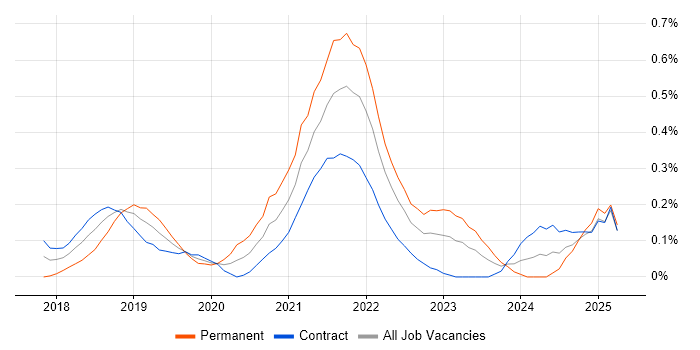Datadog
Scotland > Edinburgh
The table below provides summary statistics for permanent job vacancies advertised in Edinburgh requiring Datadog skills. It includes a benchmarking guide to the annual salaries offered in vacancies that cited Datadog over the 6 months leading up to 29 May 2025, comparing them to the same period in the previous two years.
| 6 months to 29 May 2025 |
Same period 2024 | Same period 2023 | |
|---|---|---|---|
| Rank | 83 | - | 140 |
| Rank change year-on-year | - | - | +6 |
| Permanent jobs citing Datadog | 2 | 0 | 5 |
| As % of all permanent jobs advertised in Edinburgh | 0.23% | - | 0.26% |
| As % of the Cloud Services category | 0.70% | - | 0.63% |
| Number of salaries quoted | 1 | 0 | 3 |
| Median annual salary (50th Percentile) | £72,500 | - | £85,000 |
| Median % change year-on-year | - | - | +19.30% |
| Scotland median annual salary | £72,500 | - | £85,000 |
| % change year-on-year | - | - | +19.30% |
All Cloud Skills
Edinburgh
Datadog falls under the Cloud Services category. For comparison with the information above, the following table provides summary statistics for all permanent job vacancies requiring cloud computing skills in Edinburgh.
| Permanent vacancies with a requirement for cloud computing skills | 285 | 647 | 793 |
| As % of all permanent jobs advertised in Edinburgh | 32.61% | 42.88% | 40.77% |
| Number of salaries quoted | 157 | 463 | 463 |
| 10th Percentile | £45,750 | £30,000 | £36,250 |
| 25th Percentile | £52,500 | £42,500 | £44,516 |
| Median annual salary (50th Percentile) | £70,000 | £60,000 | £60,000 |
| Median % change year-on-year | +16.67% | - | +4.35% |
| 75th Percentile | £85,000 | £73,818 | £77,715 |
| 90th Percentile | £98,474 | £90,822 | £89,852 |
| Scotland median annual salary | £57,500 | £52,500 | £55,043 |
| % change year-on-year | +9.52% | -4.62% | +0.08% |
Datadog
Job Vacancy Trend in Edinburgh
Job postings citing Datadog as a proportion of all IT jobs advertised in Edinburgh.

Datadog
Salary Trend in Edinburgh
3-month moving average salary quoted in jobs citing Datadog in Edinburgh.
Datadog
Co-occurring Skills and Capabilities in Edinburgh by Category
The follow tables expand on the table above by listing co-occurrences grouped by category. The same employment type, locality and period is covered with up to 20 co-occurrences shown in each of the following categories:
